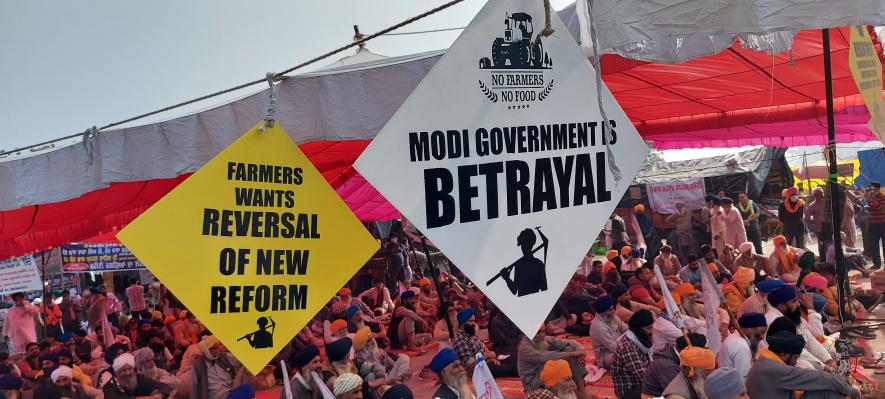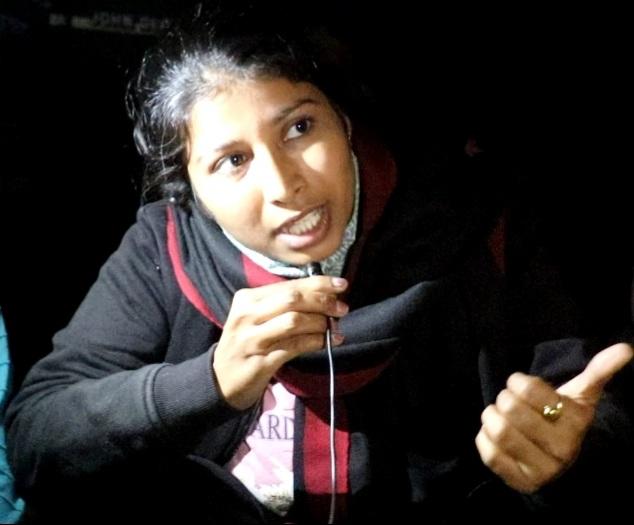Farmers’ Protest: ‘Misled’? Agitators Say They Understand Laws Better than Govt

New Delhi: The Union Government seems to be leaving no stone unturned to paint protests against the three new Farm Laws the result of a “misleading and deceptive narrative” which has resulted in “misunderstanding” among farmers. The narrative being put forth is that the Opposition is “misleading” farmers to oppose “historic” legislation which are aimed at bring about a ‘reform’ in the agricultural sector in the country.
At an event in his constituency of Varanasi on November 30, Prime Minister Narendra Modi alleged: “The Opposition is using tricks to oppose the historic agriculture reforms laws and farmers are being misled. There is a new trend now; earlier decisions of govt were opposed, now rumours have become the basis for opposition. Propaganda is spread that although the decision is fine, it can lead to other consequences about things that haven't happened or will never happen. Same is with farm laws.”
Tarun Chugh, the general secretary of the Bharatiya Janata Party (BJP), which is leading the ruling coalition at the Centre, said on December 12 that a “misleading and deceptive narrative” had led to the farmers’ protests.
Have the agitating farmers been misled? Have they gone through the three laws? Are they ill-informed and do not understand the laws well?
NewsClick spoke to several protesters at the Singhu, Tikri and Ghazipur borders of Delhi, where farmers have been staging peaceful sit-ins for the past 19 days.
Jasminder, who is studying law at Maharshi Dayanand University in Haryana’s Rohtak district, resorted to a counter-attack when asked about the government’s allegation.
“This is the first time that the government is failing to mislead such a large number of people (on this issue). It has misled people on every faulty decision, ranging from demonetisation, GST (Goods and Services Tax), CAA (Citizenship Amendment Act), a proposed nationwide NRC (National Registration of Citizens), etc, but this time they are failing miserably. Therefore, they are calling us ill-informed, Congressis and Khalistanis,” he said.
The government recently passed three Farm Laws — the Farmers (Empowerment and Protection) Agreement on Price Assurance and Farm Services Act, 2020; the Farmers’ Produce Trade & Commerce (Promotion & Facilitation Ordinance) 2020; and the Essential Commodities Act, 2020.
The first Act, which is also known as the contract farming law, creates a national legal framework for contract farming through an agreement between a farmer and a buyer before the production or rearing of any farm produce.
“The government is defending this Act by arguing that it will protect and empower farmers to engage with agri-business firms, processors, wholesalers, exporters or large retailers for farm services and sale of future farming produce at a mutually agreed remunerative price. Any contract takes place between two parties of same status. But here, the contract will be signed between a big corporate and a small farmer. Though the terms and condition would be mutually agreed, yet it will be framed by the corporate to suit their interests. The farmers will have to ensure, as per contracts, good quality production to sell them to the corporate at good prices. How will it be possible? How can one ensure quality when every crop here depends on the weather conditions? Secondly, the corporate have all the rights to break the contact, but not the farmers. Isn’t that a disparity?” he asked.
Last year, PepsiCo sued farmers from Gujarat for almost Rs one crore for illegally growing and selling a potato variety registered by PepsiCo. The company withdrew the cases after the state government intervened.
Contract farming has been in practice in parts of the country, but has seen little success. For example, snack firms often strike deals with farmers for the production of potato wafers and crisps.
At present, in the states that permit contract farming, the buyers have to get themselves registered with the agricultural market produce committees (APMCs). In case of any dispute between the two parties, the APMCs step in to settle disputes. The buyers have to pay APMCs the market fees and levies.
But the new law, which bypasses APMCs, has freed agri-business companies to engage directly with farmers. “Bypassing APMCs, the government has given a free run to big business houses,” he said.
He explained: “Initially, private players will offer prices higher than the MSP (minimum support price — the least amount announced by the government for purchase of farm produce). The same happened in the case of a Jio SIM card. It will make the farmers disinterested in selling their products to APMCs, which will gradually become ineffective. Once it happens, private players will begin exploiting farmers, who will then have no option but to sell the products at throw away prices to private companies.”
In case of any dispute, he said, the farmers no longer have any legal recourse, as they cannot drag private companies to a court of law as the law has no provision for any legal proceeding against the companies. “The matter can only be taken to the sub-divisional magistrate (SDM) and then to the district magistrate (DM). The two officers are government representatives who will always listen to corporates,” he added.
Jasminder said the second legislation — Farmers’ Produce Trade & Commerce (Promotion & Facilitation) Act, 2020 — forms legal framework for “bypassing” the existing APMC to set up a “parallel market”. “It dilutes the power of APMCs under state governments,” he said, adding that “you create as many physical markets as you wish. We don’t have any problem. Our demand is very simple: bring MSP under ambit of the law to ensure that the purchases of agricultural produces take place at the government’s price. So whosoever violates it will be punished by a court of law”.
The third law is te Essential Commodities Act, 2020, which is an amendment by introducing a new sub-section (1A) in Section 3 of The Essential Commodities Act, 1955.
The government claims that the amendment will provide a mechanism for the “regulation” of agricultural foodstuffs (such as potatoes, edible oils, pulses, oil seeds, cereals). It also seeks to regulate supplies under extraordinary circumstances, which include skyrocketing prices, natural calamity, famine and war. Major essential commodities such as cereals, pulses, oilseeds, edible oils, onion and potatoes have been removed from the list of essential commodities.

Interestingly, the government has also removed the upper cap for storage of farm produce. “By doing so, the government has removed all hurdles for the buyers to hoard food grains. Now, big corporates will purchase farm products in huge quantities after every harvesting season and store them. Then, they will create artificial demand so that their stock can be sold at a higher price. It will promote black marketing. Food products will be procured from us at lower rates and it will be sold in the market at higher prices. This is crystal clear in the Act,” he said.
However, any action on imposing stock limits will be based on the price trigger. Essential commodities have not been defined in the amended law. The Act states that an “essential commodity” means a commodity specified in the “Schedule” of this Act, and the central government can add or remove a commodity in the “Schedule”.
It implies that if it is satisfied with the necessity to do so in public interest, the Centre can notify an item as essential in consultation with state governments. The “Schedule”, at present, has nine commodities — drugs; fertilisers, whether inorganic, organic or mixed; foodstuffs, including edible oils; hank yarn made wholly from cotton; petroleum and petroleum products; raw jute and jute textiles; seeds of food-crops and seeds of fruits and vegetables, seeds of cattle fodder, jute seed, cotton seed; face masks; and hand sanitisers.
The latest items added to this schedule are face masks and hand sanitisers, which were declared essential commodities with effect from March 13, 2020, in the wake of the COVID-19 outbreak.
‘Will Taking Away Legal Recourse Help Farmers?’
“Is taking away all legal recourse in farmers’ interest?” asked Priya, a research scholar in the chemistry department at Chandigarh University. She quotes a clause from one of the laws which stated: “No suit, no prosecution, or other legal proceedings shall lie against the Central government of the state government or any other officer of the central government or any other officer of the state government or any other person (read corporate) in respect of anything which is done in good faith or intended to be in good faith under this act and no civil court shall have jurisdictions to entertain any suit or proceedings in respect of any matter connected to the actions under this law.”
“In a democratic nation, is a clause like this acceptable?” she asked again.
About the government’s argument that the farmers will now have the liberty to sell their produce anywhere, at a price of their choice, she argued, “By removing the APMC, the government ended the so-called monopoly of the ‘middlemen’ in Bihar in 2006. Did the farmers become rich there? Have you ever heard anyone wanting to buy land in Bihar and move there for farming? If the open market benefited farmers, people from Bihar wouldn’t have moved to Punjab, it would have been the other way around,” she said.
“They (the government) claim that the laws will ‘liberate’ us and this ‘reform’ will be brought by taking us out of the mandis (APMCs) or weakening it, but global instances don’t suggest so. Farming in the United States was exploited because of the open market. Our mandis will also meet the same fate if the three legislation are implemented,” she added.
Asked about the middlemen, she said: “The removal of Ahratiyas from the market will end accountability as there will be farmers and big corporates. This will remove small farmers and finally, private players will rule the roost.” She claimed that farmers understood the three Farm :aws better than the government and its spokespersons. “So, stop fooling us,” she concluded.
‘Not Middlemen but Family’
Quoting Canada-based author and farmer Brenda Schoepp, Gurkeerat Singh Sangha, a resident of Firozpur in Punjab, who is pursuing his PhD in pharmacy, said: “My grandfather used to say that once in your life you need a doctor, a lawyer, a policeman and a preacher but every day, three times a day, you need a farmer.”
He said whatever he able to do today, was because of the 14 acres of land his father owns. “We are aware and educated. We cannot be fooled and misguided. We know the government’s intention behind the three legislation and who will benefit from it,” he shot back when asked if they were ‘misled’.
He said the government claims it wants to remove the “monopoly of the middlemen or commission agents,” who farmers call Arhtiyas.
“The government argues that they (arhtiyas) have been exploiting the farmer through high commissions, faulty weighing systems, improper quality assessments, etc. But for us, they are our backbone. They are like our family members. Farmers depend on them for everything. They provide us credit for farming, marriages, rituals; in case anyone dies in the family, they supply us inputs on credit and also buy our produce back,” he said, adding: “There is a saying in Punjab, ‘If a farmer’s mother dies, it’s not the death of the farmer’s mother, but of an Arhtiya’s mother’. All the expenditure on rituals are borne by him and he settles the borrowed sum at the time of purchase.”
Daljit Singh Khanpur, a practicing lawyer from Rajpura in Punjab, explained the role of Arhtiyas in detail.
“Farmers need money instantly for seeds, sowing crops, fertilisers, pesticides, irrigation and harvesting. Soon after harvesting one crop, the season for another crops starts, for which they need money once gain. After he sells his farm produce, he does not get paid instantly. It takes two to three months for the amount to be credited in his bank account. But he needs money for his next crop. At this moment, he approaches an Arhtiya who lends him the sum he needs. The farmer pays him back the borrowed sum after he gets the amount from the APMC. This is a chain which keeps going. This is how the system works,” he explained.
Asked if he doesn’t think that the government wants to remove this dependence of the farmers on Arhtiyas, he said: “The banking process takes time. It includes complex paper work. Farmers have to mortgage their property as surety, only then is the loan approved. Farmers need money instantly. They don’t have to mortgage anything to the Arhtiyas and the payments are settled mutually. Since he belongs to the same society, he also understands the situation of the farmers and doesnt charge fines and additional charges in case of late payments. Once the farmer reaches the mandis with their farm produce, it is the responsibility of Arhtiyas to weigh, pack and sell the products at MSP. In return, if they take some service charge, what is the problem with it? Even the bank charges the same for processing papers if one applies for a loan.”
Asked about the future of their protest, as neither the government seems keen relenting, nor the farmers, he said that the farmers have already won two battles.
“First, when the government called us for a dialogue, and second when the government sent the proposal, proposing some amendments. Mind you, the same government was initially trying hard to discredit our protests by calling us anti-nationals and what not. By sending us a proposal for amendments, the government has accepted that the laws are faulty. And when you yourselves accepted that the legislation are faulty, why do you want us to accept a law with several patchworks. Scrap it and come up with a draft bill in consultation with farmers and then get it passed from both houses of Parliament. If it will be in the interest of farmers, you won’t face any opposition from us,” he added.
Farmers Intensify Protests
Following the suspension of talks between farmer unions and the government, the former have intensified their protest. Following a nationwide call given by the unions, farmers gheraoed offices of district commissioners and took out protest marches in Punjab and Haryana on Monday.
Protests were held in at least nine districts in Punjab and Haryana.
Hundreds of farmers from Rajasthan are gathered at the Haryana-Rajasthan border near Rewari. They sat in protest on one side of the Delhi-Jaipur national highway after the Haryana Police put up barricades to stop them from marching towards Delhi. The farmers are also sitting in protest at Jaisinghpur Kheda area in Rewari along the Rajasthan-Haryana border (NH-48).
Leaders of 32 farmer unions staged a hunger strike from 8 am today as part of their plan to intensify their agitation from December 14.
As farmers intensified their agitation, Union Agriculture Minister Narendra Singh Tomar said today that the government is engaging with farmer leaders to decide on the next date for talks. “The meeting will definitely happen. We are engaging with farmers,” Tomar told PTI.
“The government is ready for discussion anytime. The farmer leaders have to decide and convey when they are ready for the next meeting,” he added.
Get the latest reports & analysis with people's perspective on Protests, movements & deep analytical videos, discussions of the current affairs in your Telegram app. Subscribe to NewsClick's Telegram channel & get Real-Time updates on stories, as they get published on our website.
























